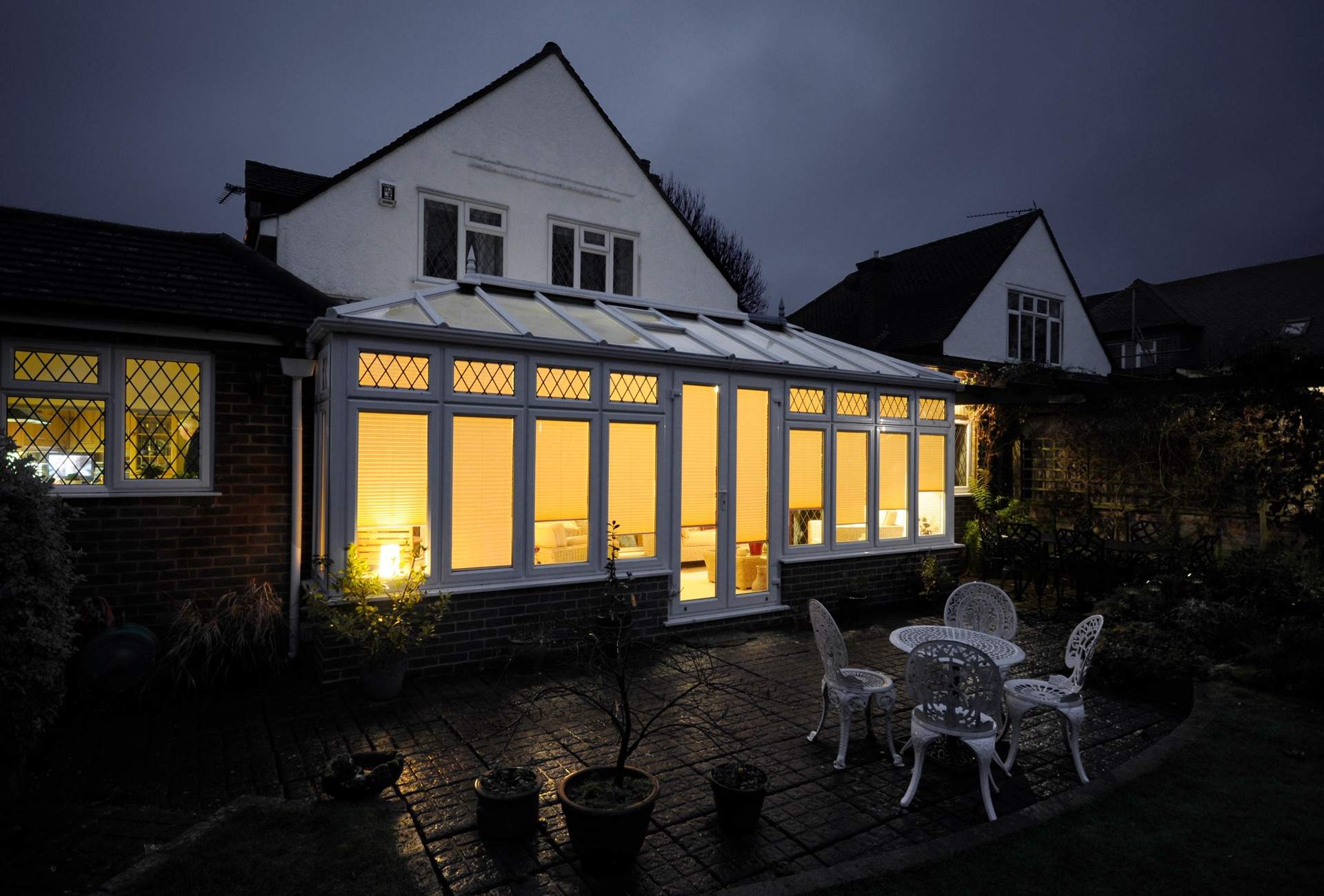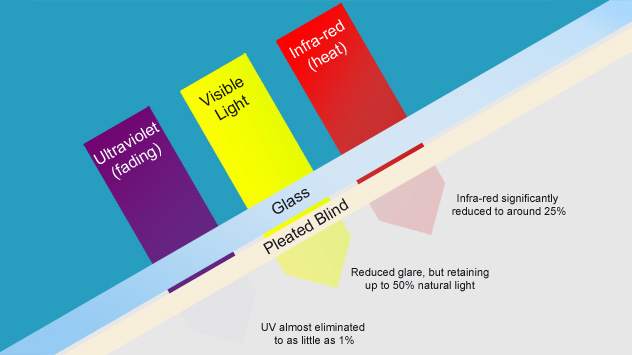WHAT TO EXPECT FROM BLINDS
Click the frequently asked questions to view the answers.
Yes, correctly specified, well-fitted roof and window blinds will help to reduce the heat in a conservatory, blocking up to 85% of the infra-red light from coming into your conservatory, as well as helping to retain the heat during the night and in the colder months of the year.
The exact amount of heat that is blocked varies from fabric to fabric, and even from conservatory to conservatory, making it difficult to quote exact figures that work for everyone.
Different fabrics can have very different effects on your conservatory, changing exactly how much light, heat and UV is absorbed, transmitted and reflected. All of which can create dramatically different effects within your conservatory.
There are several different specifications that we use to measure for different fabrics react to light, including the reflection, absorption and transmission rates for both light and solar energy (heat). There’s also factors including the UV transmission rate and the light fastness rate, which shows how resistant to fading the fabric is.
Ultimately the best way to see how a fabric would effect the light in your conservatory is to have a member of our sales team visit with their range of fabric samples, so you can see for yourself how each different fabric effects the light.
No. With the right blinds and fabric selection then your conservatory will remain bright (but without the glare) and your adjoining rooms will not be dark either.
Obviously this means that you should not select blinds with blackout or dim-out fabrics (these are much more common on cheaper blind ranges) and beware of fabrics that have an open weave to allow more light through – they are not suitable for conservatories at all.
We offer a wide range of fabrics that are solar reflective and UV resistant and yet allow a high proportion of natural light transmission whilst still reducing glare.
Absolutely! Correctly specified conservatory roof blinds can make a huge difference in heat loss during the evening and colder months.
Conservatories can obviously get uncomfortably hot on sunny days, but most conservatory owners are surprised at how cold and uninviting the room can be during the evening or on colder days of the year.
Genuine conservatory blinds can help to moderate the temperature and comfort of a conservatory all day and evening, throughout the entire year.
Most blinds can help to reduce glare, but consider that the sun not only moves across the sky but also is lower in the sky during winter – and is higher in the sky during summer. This means that different areas of the conservatory will be affected during different times of the day and year.
To effectively reduce glare in a conservatory you should have both roof and side blinds fitted, ensuring that there are truly minimal gaps and nominal sized fabric cord holes that would otherwise spoil the shading.
Fabric type and colour can also dramatically affect glare, so beware of white or very pale coloured fabrics if you wish to significantly reduce the amount of light entering your conservatory.
In a PVC conservatory we would recommend Eos and pure™ Pleated Blinds, and in a timber conservatory we would also recommend pure™ Pinoleum Blinds with solar reflective lining.
Obviously, the extent to which these benefits affect your conservatory are entirely dependent upon a wide variety of factors that cannot be answered in such a general way, without a great deal of specific information.
If your conservatory has a polycarbonate roof then you will probably have realised how noisy it can be, especially when it is windy, raining or hailing.
If you just want to improve the noise insulation then conservatory roof blinds are an ideal solution, and depending upon the shape and use of the conservatory we normally recommend Duette® pleated blinds, pure™ Pinoleum Blinds or Budget pleated blinds with high absorbency fabrics.
The amount of sound insulation blinds can provide will vary from conservatory to conservatory, and will also be affected by the specific type of blinds you use. The best way to see the effect in your conservatory is to arrange a free quotation with a member of our sales team.
Yes. Privacy is a common issue and blinds are an ideal solution.
You should not only consider the fabric, but also the blind layout: surface mounted blinds have to be fitted in front of protruding window handles and so have large gaps which compromise the privacy of the conservatory.
Roof blinds are often forgotten when it comes to privacy, so bear in mind that anyone overhead (even in your own home) can look down into your conservatory.
For neatly fitted roof and window blinds we normally recommend purpose-designed Eos and pure™ Pleated Blinds which can be fitted directly to window glazing beads, providing a neater fit than is possible with standard pleated blinds.
If just considering window blinds in a UPVC conservatory then you could also consider Perfect Fit blinds, which often allow the small edge gaps inevitable with recessed blinds to be closed off. However these blinds are not designed for conservatories and have other issues; not least of which being that the frames are not recess-fitted onto the beads, but are semi-recessed (the frame partly protrudes beyond the window) and may even clash with existing window handles.
Obviously blinds can help to add security to your conservatory whenever you are out or away on holiday, and if you choose the correct fabric you will not even darken your conservatory or adjoining rooms.
Don’t forget that your roof is also overlooked from above by your own house and any neighbouring properties that may be close enough, or even from other gardens backing on to your property, so people can tell when you aren’t at home.
Avoid surface-mounted blinds, such as roller blinds, vertical blinds etc. because they tend to have small gaps in external and internal corners, thus compromising the privacy.
If security is an issue for you, then consider Budget pleated blinds, Standard pleated blinds, pure™ pleated blinds and Eos pleated blinds. If you are only concerned with PVC windows then also look at Perfect Fit and Intu blinds.
A lot of different factors effect how much security blinds can add to a conservatory. As such, it’s hard to give any accurate information without specific details of the conservatory.
Yes, all blinds offer a degree of reduction in UV (ultra-violet) transmission through double glazing, but some are more effective than others.
The more tailored a blind is to your conservatory, the fewer gaps will exist and so the less UV will be transmitted, but even more important is the fabric…
If you select a Dim-Out fabric then you will need to operate your blinds much more often to allow natural light in to your conservatory (and to stop your adjoining room from being too dark).
We recommend Solar Design fabrics that are designed for conservatory environments, so will allow natural light transmission whilst significantly reducing UV, heat and glare, but which are very durable.
The amount of UV transmission blocked will vary based on a lot of factors; including the conservatory itself and the specific fabric used. A sales person will be able to give detailed advice as to the best fabrics for blocking UV, and how to effectively use them in a conservatory.
No. Condensation only occurs where humid air meets a cold surface, allowing water to condense.
The proximity of blinds to the glass will not cause condensation to occur – the conditions must pre-exist for this to happen but, in some circumstances, they might act as a barrier which could limit air-flow and so take longer for the condensation to evaporate.
Condensation is common in newly built conservatories where there is still a great deal of moisture still in the fabric of the building, from all of the concrete and plaster. It can take weeks for this to completely dry out – sometimes longer if the weather is very cold and/or wet.
The only real ‘cure’ for long-term condensation is to create adequate ventilation for the cold moist air (open the trickle vents at the heads of the windows and doors) and to improve the heating and air flow. This is something that should have been considered at the design stage of the conservatory.
For a short-term solution you can hire a dehumidifier (but be careful not to dry out the structure too quickly) or you can even buy large silica-gel cushions (normally meant for cars) that will help to absorb moisture from the air, but that is just dealing with the symptoms – not necessarily the cause.
Condensation is also more likely to occur when your conservatory is isolated from the rest of your home by external doors, or where there are lots of people in the room. Small conservatories tend to suffer more than average sized conservatories, because there is only a small volume of air which can quickly reach “dew point” (where there is so much humidity that it can condense).
Recessed window blinds are fitted so close to the glass that the fabric can come into contact with any condensation. If your window is dirty, then this would form a suitable organic material for bacteria to thrive and grow as mould.
You must therefore ensure that your blinds are kept clean because, by the time that mould has started to appear, it is almost certainly too late to clean the fabric and it will require replacing.
If your conservatory suffers from condensation:
Delay installation of blinds in a newly built conservatory until it is dry
Consider hiring a dehumidifier
Improve ventilation and air flow throughout the conservatory
Increase the heating and flow of warm air
Avoid any ‘cold spots’ from being created
Keep your glass clean, but avoid any aggressive chemicals
Make sure that your blinds are kept clean at all times
Keep blinds retracted when you know condensation is forming
Check for a small concealed leak or water ingress by capillary action
In serious cases, take your blinds down to stop them from becoming damaged








